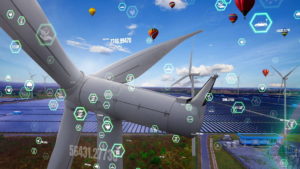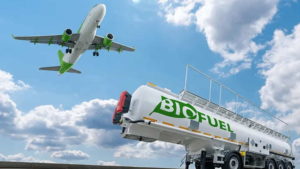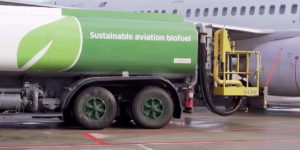Have you heard of the technology of future in the air travel? Yes, it’s Sustainable Aviation Fuel (SAF)! There is rising worry about the pollution that airplanes and travel produce in a society where they play a significant role in our daily lives. Planes release pollutants that are bad for the environment, just like cars do.
Transportation is an important part of life, particularly for those affiliated a lot with traveling.
Since a thing has been associated with daily life, it is therefore important for it to be not harmful and be environmentally-friendly.
So, the exciting part would be to make flying much greener and more environmentally friendly.
Here Sustainable Aviation Fuel, or SAF for short, comes in and rocks. It’s similar to a particular kind of fuel that airplanes can use to fly, but it’s produced in a way that less impacts the environment. The SAF world is improving air travel for everyone while also becoming more environmentally-friendly and sustainable.
The aviation sector is a fundamental element of international transportation and has come under fire for its impact on the environment.
The search for more environmentally-friendly options has sky highlighted the creation of different solutions, one of which is Sustainable Aviation Fuel (SAF), which is a response to the growing worries about climate change and carbon emissions.
Worldwide technology SAF has its importance, manufacturing techniques, types, current adoption, possibilities in the future, and individual contributions.
In simple words if we talk about the technology of future and Sustainable Aviation fuel,
The airplanes we use for travel and transportation contribute to pollution. Because this pollution threatens the ecosystem and the quality of the air we breathe, so it is a matter of huge concern, especially now that humanity is doomed to climate and environmental changes.
Therefore, researchers in worldwide technology and business start-ups are looking for ways to make flying less environmentally harmful.
What Exactly Does Sustainable Aviation Fuel (SAF) Mean?

Sustainable Aviation Fuel (SAF) can be compared to a unique form of environmentally-friendly fuel that airplanes can use for flight, but it is manufactured from materials that are less damaging to the environment. It is like aviation powered by cleaner energy.
- Using SAF helps reduce pollution which is not only healthy for the environment but for us because of the air we breathe.
- Even if planes are not the biggest polluters, they still contribute to the issue.
The technology of future can be produced in various methods. Some are produced using technology that converts carbon dioxide into fuel, while others are made from plants and garbage. - Furthermore, SAF can be made from a range of feedstocks, including biomass, used cooking oil, agricultural waste, and even carbon dioxide that has been drawn out of the atmosphere. These feedstocks support the circular economy and help in avoiding war with food crops.
- Environmentally-friendly fuel is produced using these techniques.
- If it is generating less greenhouse gases and pollutants than conventional fossil-based aviation fuels, there will be considerably less environmental effect of air travel.
- SAF shares numerous Eco-Conscious and Eco-Friendly characteristics with regular jet fuel but has a lower carbon footprint.
It can significantly reduce lifecycle greenhouse gas emissions compared to standard jet fuel, depending on the sources and techniques used. Some newly developed SAF methods even produce a net reduction in greenhouse gas emissions.
Is Sustainable Aviation Fuel Truly Needed?

Yes and why not?
If sustainability is really important, it should be for every impactful sector.
There is an urgent need to lessen the aviation industry’s environmental impact because it accounts for a sizable amount of carbon dioxide emissions.
Traditional jet fuels, which are made from fossil fuels, discharge a lot of pollutants and greenhouse gases into the environment.
SAF stands out as a practical option for decarbonizing aviation and addressing the negative environmental effects of the technology of future. This should be a practical worldwide technology.
Sustainable Aviation Fuel Types

- Hydroprocessed Esters and Fatty Acids (HEFA): These fuels, which are derived from vegetable and animal fats, provide a solution to minimize emissions and lifecycle carbon intensity.
- Fischer-Tropsch Synthetic Paraffinic Kerosene (FT-SPK): FT-SPK is a flexible option for producing aviation fuel sustainably. It is made by converting biomass or natural gas.
- Alcohol-to-Jet (ATJ): ATJ fuels are produced using alcohols generated from sustainable sources. They show beneficial qualities and are compatible with current engines.
- Power-to-Liquid (PtL): PtL fuels are created by splitting water into hydrogen and carbon dioxide, which is then mixed to create a synthetic fuel.
The Ending Notes
Suitability is the key to a better future, therefore its roots should be incorporated in several sectors.
Be it Better Air Quality, Energy Security and diversity, or overall well-being, SAF helps in unbelievable ways.
Correspondingly, choosing airlines that promote SAF use and implementing sustainable travel behaviors are two ways that individuals can support sustainable practices.
A significant step toward decarbonizing the aviation sector is Sustainable Aviation Fuel. SAF is positioned to change air travel by lowering its environmental effect as technology develops.
So, what do you think about the technology of future Sustainable Aviation Fuel?













